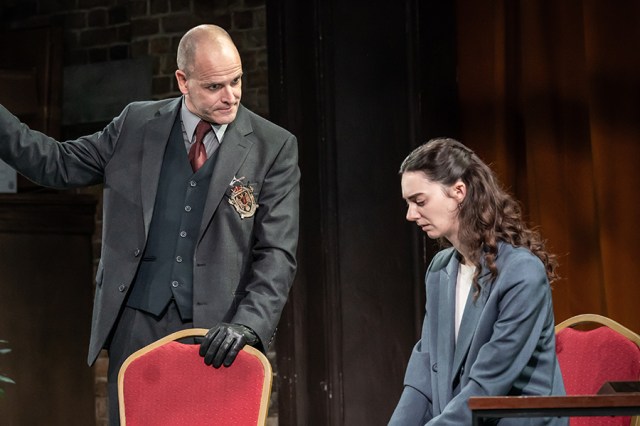Almeida Theatre, London – until 23 September 2023
Reviewed by Alun Hood
5*****
There’s a specific thrill when something happens in theatre and you realise that you could only experience that particular moment ‘live’, as opposed to being at the cinema or watching it on telly. Jeremy Herrin’s hair-raising staging of Sam Holcroft’s darkly funny new play A Mirror at the Almeida is full of such moments. It’s a veritable cornucopia of coups de theatre, culminating in a real jawdropper, and it’s ultimately as exhilarating as it is deeply disturbing and dislocating.
For this production, the beloved Islington playhouse has been transformed into a wedding venue, all pastel coloured balloons, chocolate box-y floral displays and an abundance of fairy lights, while half of the stalls seating has been replaced with the sort of buttock-challenging plush-covered metal structures we’ve all endured at hotel and civic hall ceremonies. It’s kitschy but enchanting (designer Max Jones, lighting by Azusa Ono); look closely at the walls though and between the fake ferns and roses you’ll see disturbing signage. “Do you know how to report illegal cultural activities?” demands one, while another invites us to participate in helping to “stamp out treason in the Motherland”. The ante of unease is further upped when an almost unrecognisable Jonny Lee Miller takes the mic and thanks us all for being here, and acknowledging that we’re putting ourselves at risk, before asking us to stand to welcome the bride and groom. What’s going on?
What’s going on is an act of social, political and artistic rebellion that interrogates the nature of free speech and the liberty of artistic freedom, and by being present, we are all complicit. Holcroft, Herrin and team have created an all-too-recognisable alternative universe where creative voices are silenced if they don’t fall in line with the values and opinions of the ruling regime, and it’s not hard to find parallels in the UK at the moment (remember when the arts organisations that received government hand-outs during Covid lockdowns were required to express their thanks across all social media platforms?). The othering of people who don’t look and think like us is a theme here with another unwelcome resonance.
The play’s title, A Mirror, might suggest a reflection of our own society, or at least where it could be heading, but also invokes a hall of mirrors, as scenes play out then get discussed, discarded or expanded upon, and you find yourself questioning what is real and what isn’t. It’s tricky to describe without spoiling it for anybody who already has tickets (the Almeida run is sold out, but this screams West End transfer as long as they can retain a similar intimacy in a central venue) but if you can envision a swirling together of Pirandello, Kafka, Orton and Pinter, with maybe a sprinkling of current West End smash The Pillowman, you’ll have some idea of the tone.
Herrin manages it all brilliantly, giving the humour and the nastiness full measure, but also honouring the humanity pulsing under the fear and lunacy. The entire performance is punctuated by Miriam Wakeling’s live cello playing, beautiful but unsettling, another character in itself.
Holcroft’s dialogue is wonderful: elegant, witty, on edge and, when it needs to go there, absolutely brutal. From a dramaturgical point of view, the play and the whole concept are so unusual that it’s hard to work out if the storytelling is ingenious or a bit messy. I’m inclined to give it the benefit of the doubt as, like the aforementioned The Pillowman, part of the point of A Mirror is the power and importance OF storytelling, and this mostly feels like world class creatives at the absolute top of their games.
This especially extends to the acting. Jonny Lee Miller is terrific as the government man, trying his best to stick rigidly to the rules while unable to fully contain an innate humanity and child-like enthusiasm for theatrics. He’s simultaneously sinister and sympathetic, all mirthless laugh, uncomfortable body language and fragile pomposity. Micheal Ward as the writer who appears to be the major thorn in his side is compelling and disarmingly natural. Geoffrey Streatfeild nails unerringly the preening flamboyance of another writer far more in sync with State thinking, but gives him an intriguing marbling of kindness and decency.
A glorious Tanya Reynolds excels as a new recruit to the sinister ministry, who becomes an unexpected, unwilling epicentre for the male machinations. When she claps back, it’s extremely potent: she points out that when a woman is listening, wrapt, to a much more powerful man, it’s usually due to fear rather than adoration. Reynolds is an extraordinary stage presence, gawky yet in control, vulnerable but tough. Aaron Neil appears only briefly at the end but is a funny, troubling figure who focuses and revitalises everything we’ve already seen.
It’s unusual to see a piece of theatre that is simultaneously deeply serious, maybe a warning, but also a lot of fun. A Mirror exists to be both. The wedding set-up felt like a bit of a gimmick initially but by the end of a two hour interval-free performance, intense but also intensely entertaining, it felt like an absolute essential part of the overall experience. Chilling, thrilling stuff: it’ll be worrying me for a long time I suspect.
Also, everything I’ve just told you could be a lie, and you won’t know unless you see A Mirror. That’s not a spoiler. Or is it?

